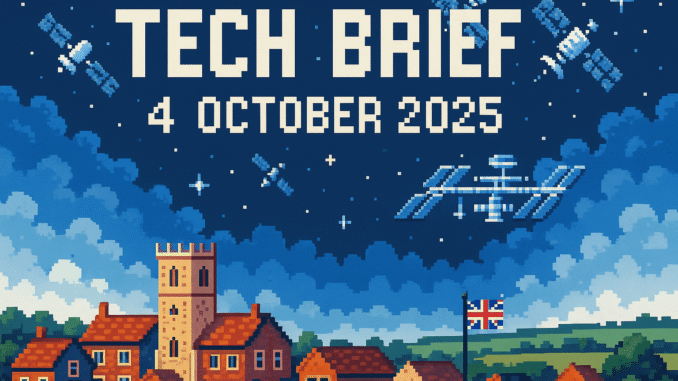
Tech Brief 4 October 2025 brings you stories that leap from Worcestershire’s grassroots innovation to NHS digital upgrades and billion-pound space ambitions. Today’s headlines travel from small-town Britain to orbit, showing just how quickly tech’s boundaries can shift, sometimes to the least expected places.
Missed yesterday’s Tech Brief? Catch up here before diving in.
Malvern Startup Tackles Modern Cyberthreats
“Don’t trust logins from anyone who pronounces ‘password’ like it’s 1995,” a Malvern engineer jokes, before unveiling new anti-hacker tech from a startup buried deep in Worcestershire. This is not a corporate cyber giant. It is a local team determined to put British brains at the frontline of internet security again. Their latest system improves how websites verify users, targeting the wave of identity theft and digital fraud that old login routines can’t stop.
If you ever dealt with password resets on Amstrad PCWs or scrawled logins onto floppy disk labels, this feels oddly familiar. Today’s hacking risks aren’t theoretical: losing your data or identity can sink a small business or family overnight. Forums are buzzing about tech that isn’t London centric, bringing the independent spirit of early UK coding scenes into the present. The next challenge is whether regional startups can build trust across an internet that forgot their postcode.
NICE Brings Digital Parity to NHS Tech
How many scanned X-rays and medical records have been stuck in limbo because of patchwork NHS tech? More than anyone will admit. NICE’s expanded HealthTech evaluations now promise to break the cycle by assessing emerging tools for use across every region, not just the wealthier Trusts.
This means digital health innovations, from virtual appointment systems to smart monitoring devices, must meet national standards. It won’t matter if your hospital still boots a MicroVAX or sits at the edge of cloud data. The expectation is equal digital upgrades everywhere. For practitioners trying to keep up with complicated IT rules, the real win is in the details: consistency, fairness, and actual user training are now priorities.
As above on cybersecurity, there’s a trend here: regional and under-served communities refusing to be left behind by tech progress. It might have taken decades, but NHS modernisation could finally break out of its 1993 mindset.
Bezos Predicts Data Centres in Orbit
Would a Sinclair ZX Spectrum collector ever have dreamed of beaming BASIC code from orbit? Amazon founder Jeff Bezos now claims gigawatt-size data centres could soon float in space, powered by endless solar energy and dwarfing anything on the ground. His pitch sits at the crossroads of environmental necessity and sci-fi ambition, with Blue Origin proposing future “server farms in the void” to meet both energy and data demand.
For some, this sounds only slightly less plausible than finding a spare RAM chip in the shed. Technical hurdles are massive: satellite maintenance, cooling, and latency are all unsolved. But after watching cloud platforms remake British business in a decade, maybe this leap isn’t as wild as it sounds. The next time an old kit crunches numbers slowly, someone in orbit could be handling the heavy lifting, never hearing the dial-up screech.
From the Wayback Machine
On This Day: 1903. John Vincent Atanasoff, pioneer behind the first true electronic digital computer, was born. His Atanasoff Berry Computer, built at Iowa State in the late 1930s, quietly set the groundwork for every binary logic circuit that followed. The project faded into obscurity until patent battles decades later forced the world to take notice. Today, every desktop, phone, and microcontroller owes something to Atanasoff, even if most people think the ENIAC came first.
What This Means
Regional voices are shaping future tech policy and invention. Tech Brief 4 October 2025 highlights more than just London or Silicon Valley. If you were tired of being sidelined, this is your moment. Maybe the path from school IT suite to server farm in space has never looked so lively.
Stay curious, keep tinkering, and don’t let anyone tell you a soldering iron can’t change the world.
Missed yesterday’s Tech Brief? Catch up here

Leave a Reply